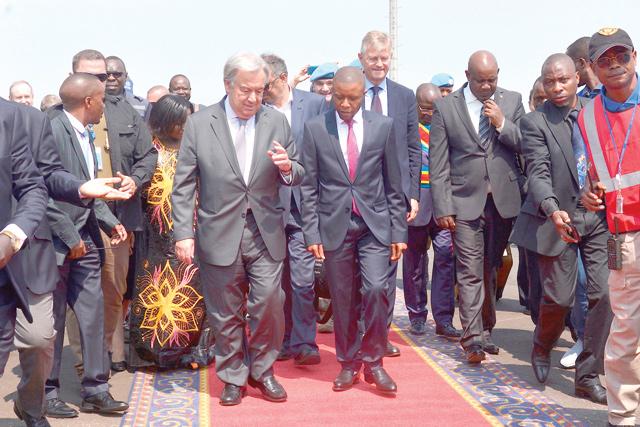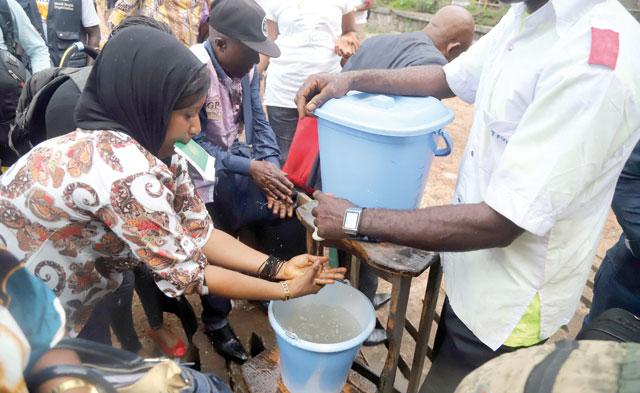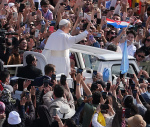You are here
Second Ebola vaccine introduced in DRC
By AFP - Nov 14,2019 - Last updated at Nov 14,2019
GOMA, DRC — The Democratic Republic of the Congo (DRC) on Thursday introduced a second vaccine to fight a 15-month-old epidemic of Ebola in the east of the country, Doctors Without Borders (MSF) said.
The new vaccine, produced by a Belgian subsidiary of Johnson & Johnson, will be administered to about 50,000 people over four months, the charity said.
More than a quarter of a million people, many of them frontline health workers, have been immunised with another anti-Ebola vaccine in a programme begun last year.
The epidemic began in August 2018 in the province of North Kivu before spreading to neighbouring Ituri and South Kivu — a remote and largely lawless region bordering Uganda, Rwanda and Burundi.
The notorious haemorrhagic virus has so far killed 2,193 people, according to the latest official figures.
It is the DRC's 10th Ebola epidemic and the second deadliest on record after an outbreak that struck west Africa in 2014-16, claiming more than 11,300 lives.
Two-dose vaccine
Fifteen people received an injection of the new vaccine in MSF facilities in the North Kivu capital of Goma early on Thursday, a spokeswoman for the charity said.
The formula is administered in two doses at 56-day intervals, and those who have received the vaccine have been reminded to return for the second shot, she said.
The disease's epicentre is about 350 kilometres north of Goma, a sprawling urban hub of between one and two million people on the border with Rwanda.
Four Ebola cases were recorded in the city in July and August, sparking fears the virus could spin out of control in a chaotic, mobile environment.
Efforts to combat Ebola in the eastern part of the DRC have been hampered by militia violence and local resistance to preventative measures, care facilities and safe burials.
Health workers have been attacked 300 times, leaving six people dead and 70 wounded since the start of the year.
Despite these problems, statistics point to a downward trend.
The health ministry late Wednesday said it had recorded four new cases of Ebola but no deaths, while 508 suspected cases were being monitored.
"In its current phase, the epidemic is not urban but has become rural," Professor Jean-Jacques Muyemebe, in charge of coordinating the anti-Ebola fight, said last month.
"We have to track it down, force it into a corner and eliminate it," he said.
Novel vaccines
The new J&J vaccine was initially rejected by the DRC's former health minister Oly Ilunga, who cited the risks of introducing a new product in communities where mistrust of Ebola responders is already high.
But Ilunga's resignation in July appears to have paved the way for approval of the second vaccine. He currently faces charges that he embezzled Ebola funds.
Both vaccines are novel formulas that, when they were introduced, had been tested for safety but were unlicensed, meaning that they had yet to achieve formal approval from drug authorities.
The first vaccine, rVSV-ZEBOV, has been given to 251,079 people, according to figures released on Wednesday.
Manufactured by the US laboratory Merck Sharpe and Dohme, the vaccine was licensed by the European Commission last week. It is being marketed under the brand name of Ervebo.
On Tuesday, the World Health Organisation announced it had "prequalified" Ervebo — an important regulatory procedure that will allow the drug to be quickly deployed in future Ebola outbreaks.
Related Articles
KINSHASA — The World Health Organisation (WHO) on Wednesday declared the Ebola outbreak in the Democratic Republic of the Congo (DRC) a "pub
GOMA, DRC — UN chief Antonio Guterres started a three-day tour of the Democratic Republic of the Congo (DRC) on Saturday, expressing "solida
GOMA, Democratic Republic of the Congo — Health workers in the Democratic Republic of the Congo will begin a vaccination campaign on Monday

















